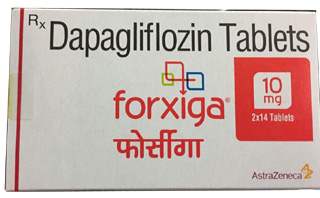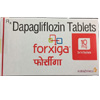  | Forxiga is used alone and in combination with other medications for the control of blood glucose in people with type 2 diabetes. This medication should be used as part of an overall diabetes management plan that includes a diet and exercise program. Active Ingredient: Dapagliflozin Availability: In Stock (39 packages) |
| Product name | Per Pill | Savings | Per Pack | Order |
|---|---|---|---|---|
| 14 pills | $4.18 | $58.52 | ADD TO CART | |
| 28 pills | $3.79 | $10.92 | $117.04 $106.12 | ADD TO CART |
| 42 pills | $3.66 | $21.85 | $175.56 $153.71 | ADD TO CART |
| 56 pills | $3.59 | $32.77 | $234.08 $201.31 | ADD TO CART |
| 70 pills | $3.56 | $43.69 | $292.60 $248.91 | ADD TO CART |
| 84 pills | $3.53 | $54.62 | $351.12 $296.50 | ADD TO CART |
| 98 pills | $3.51 | $65.54 | $409.64 $344.10 | ADD TO CART |
| Product name | Per Pill | Savings | Per Pack | Order |
|---|---|---|---|---|
| 14 pills | $3.98 | $55.72 | ADD TO CART | |
| 28 pills | $3.61 | $10.40 | $111.44 $101.04 | ADD TO CART |
| 42 pills | $3.48 | $20.80 | $167.16 $146.36 | ADD TO CART |
| 56 pills | $3.42 | $31.20 | $222.88 $191.68 | ADD TO CART |
| 70 pills | $3.39 | $41.60 | $278.60 $237.00 | ADD TO CART |
| 84 pills | $3.36 | $52.01 | $334.32 $282.31 | ADD TO CART |
| 98 pills | $3.34 | $62.41 | $390.04 $327.63 | ADD TO CART |
Drug Name
Forxiga (Dapagliflozin)
Drug Uses
Forxiga is indicated in adults aged 18 years and older with type 2 diabetes mellitus to improve glycaemic control as:
Monotherapy
When diet and exercise alone do not provide adequate glycaemic control in patients for whom use of metformin is considered inappropriate due to intolerance.
Add-on combination therapy
In combination with other glucose-lowering medicinal products including insulin, when these, together with diet and exercise, do not provide adequate glycaemic control (see sections 4.4, 4.5 and 5.1 for available data on different combinations).Drug Class and Mechanism
Dapagliflozin belongs to the class of medications known as oral antihyperglycemic agents. It is used alone and in combination with other medications for the control of blood glucose in people with type 2 diabetes. This medication should be used as part of an overall diabetes management plan that includes a diet and exercise program. Dapagliflozin works by increasing the amount of glucose being removed from the body by the kidneys, which decreases the amount of sugar in the blood.
How to use
The recommended starting dose for dapagliflozin is 5 mg taken by mouth once a day. Your doctor may adjust the dose up to a maximum 10 mg daily, depending on how effective it is and how well it is tolerated.
Dapagliflozin should be taken at the same time every day. The tablets should be swallowed whole with some fluid and may be taken with food or on an empty stomach.Warnings/Precautions
Before you begin using a medication, be sure to inform your doctor of any medical conditions or allergies you may have, any medications you are taking, whether you are pregnant or breast-feeding, and any other significant facts about your health.
Dapagliflozin is not suitable for people who:
Have type 1 diabetes
Are pregnant or breastfeeding
Have low kidney function
Are galactose intolerant
Have low salt levels in their body
Are under the age of 18 or over the age 75
People on a course of Actos (pioglitazone) or loop diuretics should also avoid taking Forxiga.Possible Side Effects
Side effects of Forxiga may include:
Hypoglycemia –if taken with sulphonylureas or insulin
Thrush
Urinary tract infections
Increased need to visit the toilet (polyuria)
Pain when urinating
Changes in levels of blood fats
Lowering of blood pressureCheck with your doctor as soon as possible if any of the following side effects occur:
redness or rash of the penis or foreskin (yeast infection)
signs of dehydration (e.g., decreased urine, dry skin, dry and sticky mouth, sleepiness, dizziness, headache, thirst, confusion)
signs of vaginal yeast infection (e.g., vaginal odour, curd-like discharge, itching)
symptoms of low blood sugar (e.g., cold sweat, cool pale skin, headache, fast heartbeat, weakness, blurred vision)
symptoms of a urinary tract infection (e.g. pain when urinating, urinating more often than usual, low back or flank pain, strong odour)
Stop taking the medication and seek immediate medical attention if any of the following occur:
fainting or lightheadedness when standing
severe dehydration (e.g., confusion, sweating stops, heart palpitations)
severe hypoglycemia (low blood sugar; disorientation, loss of consciousness, seizure)
signs of a serious allergic reaction (e.g., abdominal cramps, difficulty breathing, nausea and vomiting, or swelling of the face and throat)